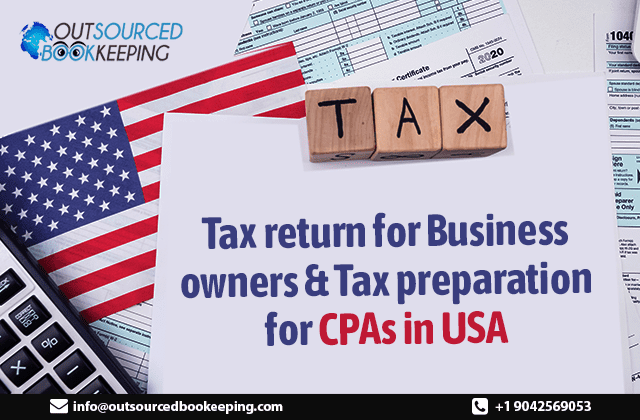For both business owners and Certified Public Accountants (CPAs) in the United States, the annual tax return season is a critical and challenging period. Business owners must comprehend the intricate details of tax obligations to ensure compliance with the ever-evolving tax code and optimize financial outcomes. Tax preparation for CPAs is an essential process that requires an in-depth understanding of the current tax laws, deductions, credits, and deadlines. By working with experienced CPAs or tax professionals, businesses can navigate these complexities and ensure accurate filings, ultimately minimizing tax liabilities.
Simultaneously, CPAs help in tax and accounting services as they navigate through complex tax codes and regulations to ensure their clients comply with the law while maximizing returns. Let us first explore the key aspects of tax returns for business owners in the USA, shedding light on crucial considerations and offering guidance to navigate this complex landscape.

-
Business Structure Matters
The first decision a business owner faces is choosing the right business structure, which significantly impacts tax obligations. Sole proprietorships, partnerships, corporations (C or S), and limited liability companies (LLCs) each have distinct tax implications.
Sole proprietors report business income on their tax returns, whereas corporations face a separate corporate tax structure. In contrast, LLCs and partnerships typically pass through income to the owners’ personal tax returns.
-
Record-Keeping and Documentation
Accurate record-keeping is the bedrock of successful tax returns. Business owners must maintain detailed records of income, expenses, receipts, and other financial transactions. Robust documentation not only ensures compliance but also simplifies the tax preparation process. Utilizing accounting software or professional services can streamline this aspect of financial management.
-
Deductible Business Expenses
Identifying and maximizing deductible business expenses is a key strategy for reducing taxable income. Common deductible expenses include office rent, utilities, employee wages, marketing costs, and business-related travel. Business owners should stay informed about changes in tax laws to capitalize on new deductions and credits that may arise.
-
Depreciation and Asset Write-Offs
For businesses that invest in tangible assets, such as machinery or equipment, understanding depreciation rules is crucial. The IRS allows businesses to recover the cost of certain assets over time through depreciation. Furthermore, small businesses can benefit from Section 179, which allows for immediate expensing of qualifying assets, rather than depreciating them over time. As a result, businesses can potentially save money and improve cash flow in the short term.
-
Quarterly Estimated Tax Payments
Business owners are responsible for making quarterly estimated tax payments, which cover both income and self-employment taxes. However, failing to make these payments can result in penalties and interest. Therefore, accurate estimation of tax liability and timely payments are essential to avoid financial repercussions. In addition, staying on top of these payments helps ensure that business finances remain in good standing and avoids unnecessary stress during tax season.
-
Seek Professional Assistance
Given the complexity of the tax code and its frequent updates, seeking professional assistance is, therefore, a prudent move. In fact, CPAs and tax advisors can provide valuable insights, ensuring that business owners not only take advantage of available tax-saving opportunities but also remain compliant with regulations.
Tax Preparations for CPAs
Given below are some key aspects of tax preparation for CPAs in the USA.
-
Understanding the Regulatory Landscape:
The tax code in the United States is notoriously intricate, with frequent updates and amendments. As a result, CPAs must stay abreast of changes in tax laws at both federal and state levels, ensuring they provide accurate and up-to-date advice to their clients. Moreover, continuous professional development is crucial for CPAs to remain well-informed about new regulations, credits, and deductions that may impact tax planning. Consequently, staying current is essential for maintaining compliance and offering the best advice possible.
-
Utilizing Advanced Software:
CPAs have many advanced software tools at their disposal to streamline tax preparation processes. Leveraging tax software not only enhances efficiency but also reduces the likelihood of errors. Integrating these tools into their practice allows online CPA tax preparation to automate routine tasks, allocate more time to complex issues, and ultimately provide better value to their clients.
-
Client Communication and Documentation:
Clear communication with clients is paramount in tax preparation. CPAs should establish open channels of communication to obtain all necessary documentation promptly. Educating clients on the importance of thorough record-keeping and the specific documents required for tax filing can help avoid delays and ensure the accuracy of the return.
-
Strategic Planning for Deductions and Credits:
CPAs play a crucial role in helping clients identify eligible deductions and credits to optimize their tax position. From business expenses to education credits, a comprehensive understanding of the tax code allows CPAs to strategically plan for potential savings. This involves a thorough examination of clients’ financial situations and a proactive approach to tax planning throughout the year.
-
Compliance with Ethical Standards:
Maintaining the highest ethical standards is non-negotiable for tax preparation for CPAs in the USA. Adhering to ethical guidelines not only ensures compliance with professional regulations but also builds trust with clients. CPAs must prioritize confidentiality, integrity, and objectivity in all aspects of their tax preparation services.
Managing tax returns for business owners and facilitating tax preparation for CPAs in the USA demands precision and expertise. Outsourced Bookkeeping stands out as a reliable partner, offering tailored solutions for streamlined tax compliance.
Backed by a seasoned team, updated knowledge of the current tax laws, and the use of cutting-edge technology ensure optimal financial outcomes for businesses. Trust Outsourced Bookkeeping to navigate the complexities, allowing you to focus on business growth.








